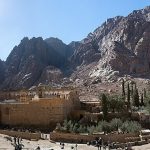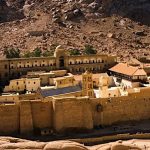By Sarantis Michalopoulos Euractiv –
Euractiv gained rare access to the monastery, where monks expressed deep anxiety over the future.
Saint Catherine, EGYPT – At the foot of Mount Sinai, the Greek Orthodox Monastery of St. Catherine stands as one of Christianity’s oldest active places of worship.
Now, the monastery faces an existential threat after an Egyptian court ruled to confiscate its property – a move that has triggered a wave of concern from Athens to Brussels.
The court decision, which stipulates that the monastery can continue its religious operations but no longer holds ownership of its land, has been described by Greek officials as a thinly veiled attempt to appropriate a sacred site under the pretext of state control.
The ruling is believed to have originated from a case filed by individuals linked to the Muslim Brotherhood, an Islamist movement established in Egypt in the 1920s that is known for advocating the integration of Islamic principles into government and that is often criticised for its hardline ideological views.
Euractiv gained rare access to the monastery, where monks expressed deep anxiety over the future.
“The monastery has survived empires and invasions,” one monk said, speaking on condition of anonymity. “We pray it survives this.”
Others posed a more haunting question: “Will we be guests in our own home?”

Preserving a sacred legacy
Founded in the 6th century and recognised by UNESCO as a site of “outstanding universal value”, St. Catherine’s Monastery attracts over 100,000 pilgrims and tourists annually. It is home to priceless Byzantine icons, mosaics, and one of the most significant collections of early Christian manuscripts in existence.
For the Greek government and the Orthodox Church, the site is more than a historic landmark – it is a living religious institution with deep cultural and spiritual ties to Greece. The monastery’s fate has become a politically sensitive issue in Athens, especially given the constitutional prominence of the Orthodox faith.

Foreign Minister Giorgos Gerapetritis (was) set to meet his Egyptian counterpart, Badr Abdelatty, in Cairo, aiming to defuse tensions while firmly reiterating Greece’s position that the monastery’s ownership is non-negotiable.
Greek fears have also been fuelled by parallels to the 2020 reconversion of Hagia Sophia in Istanbul, a UNESCO World Heritage site, into a mosque – a move that was widely condemned in Greece.

A geopolitical balancing act
The dispute comes at a time when Egypt and Greece are deepening cooperation in the eastern Mediterranean. They have signed bilateral maritime agreements, countering Turkish ambitions in the region, and have launched a joint project to transfer green energy from Egypt to Europe via Greece.
Athens and Cairo have also collaborated closely in recent years to manage migration flows from North Africa. Their partnership solidified following the 2019 maritime memorandum of understanding signed between Turkey and Libya, which sought to define economic zones for natural gas exploration. Greece and Egypt rejected the Turkish-Libyan agreement as illegal and in response, signed their own MoU on maritime boundaries in 2020.
Gerapetritis’ mission in Cairo is diplomatically delicate. He must defend the monastery’s legal status while maintaining positive relations with Egypt – a key strategic ally for Greece in the often volatile eastern Mediterranean.

Greek diplomatic sources insist that Athens will not compromise on the question of ownership.
They point out that the Monastery of St. Catherine safeguards an irreplaceable cultural heritage, including early Christian mosaics and rare Byzantine icons.
In early May, President Abdel Fattah el-Sisi assured Prime Minister Kyriakos Mitsotakis that Egypt would not alter the monastery’s status – a commitment embedded in the joint strategic declaration between the two nations.
However, trust has been undermined by Cairo’s delay in ratifying that declaration until after the court ruling. The Egyptian presidency has since reiterated its commitment to preserving the monastery’s “unique and sacred religious status”, though notably, it avoided mention of ownership.

Mounting pressure in Europe
Meanwhile, Greek opposition parties are pressuring the conservative government to take a firm line, warning that a diplomatic failure could carry domestic political consequences. The site’s significance – believed to be located where God revealed himself to Moses in the Burning Bush – adds to the national and religious resonance.
Greek MEP Nikolas Farantouris has called for a freeze on €4 billion in EU funds allocated to Egypt. “We approved this money in the European Parliament for the management of migration flows and the modernisation of Egypt’s administrative services, subject to respect for human rights and religious communities,” he told Euractiv.
The European Commission confirmed to Euractiv that it is monitoring developments closely. An EU spokesperson said that Egyptian authorities recently reassured European diplomats the ruling does not restrict the monks’ access and formally protects the monastery site for the first time.

The monastery ‘survived through centuries’
Following the court’s decision, the 20 monks residing in the monastery have temporarily closed its doors to visitors. Instead, they have withdrawn into prayer, hoping that diplomacy – both divine and political – can preserve what has endured for centuries.
Euractiv spoke to several monks who shared their concerns in confidence.
“The monastery survived through centuries and has nothing to fear,” one monk reflected.
“Will we be guests in our home?” another asked.
Church officials in Athens suspect a deeper agenda. “We were very anxious about the trial, which has its roots in fundamentalist circles in Egypt and the Muslim Brotherhood,” said Archimandrite Porphyrios Fragakis, the Holy Monastery’s representative in Greece, in a recent television interview.
As the monastery awaits its fate, the broader geopolitical and religious implications of the case continue to reverberate across the region – and Europe is watching closely.



__________________________________
Top photo: Founded in the 6th century and located at the foot of Mount Sinai, the Monastery of Saint Catherine’s is considered one of the most sacred destinations for Christians. [Photo by Sarantis Michalopoulos





